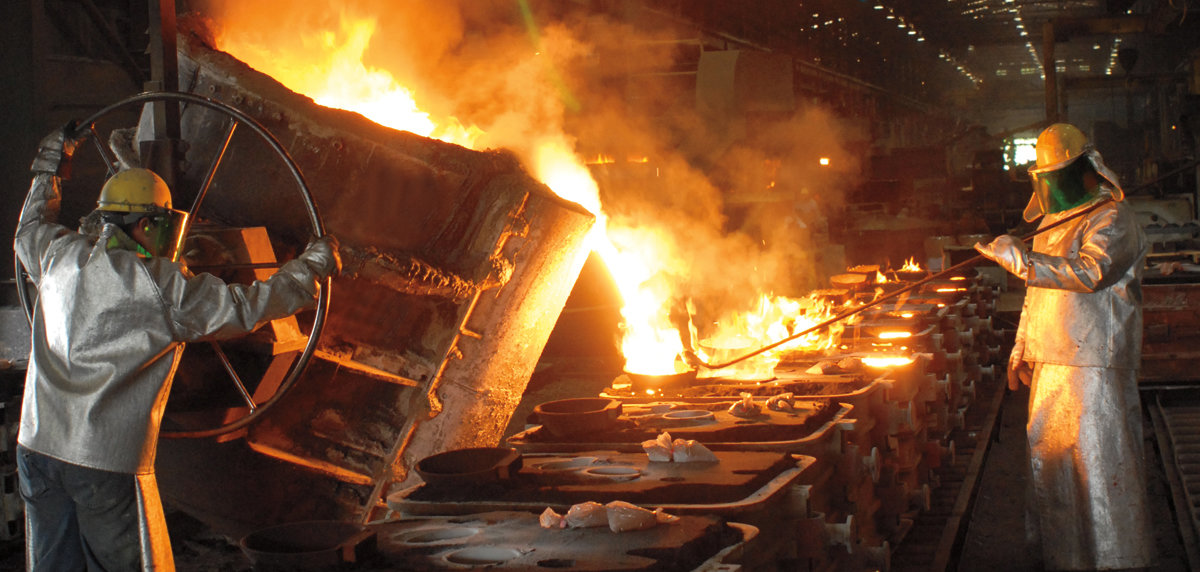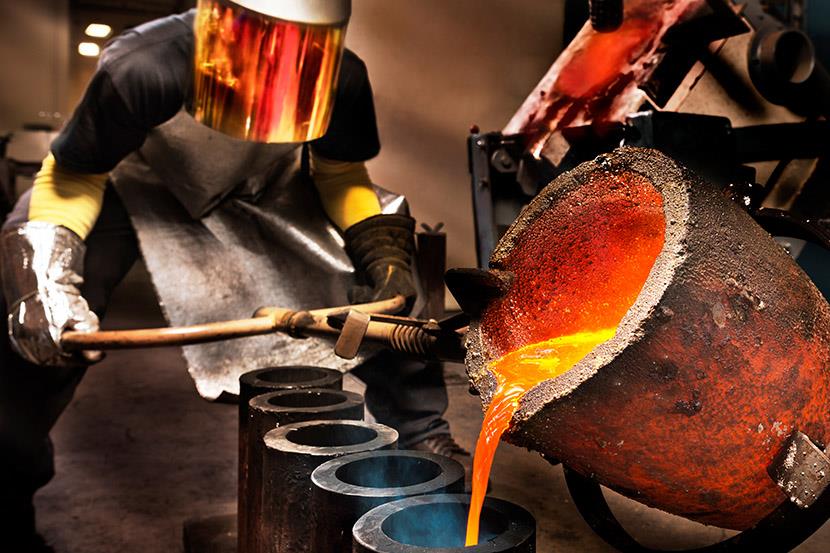Step-by-step guide of how a Metal Foundry turns raw materials into final cast products
Just How a Metal Foundry Adds To Sustainable Metal Manufacturing Practices
Metal foundries play a vital function in promoting sustainability within the metal manufacturing industry. By integrating recycled products, they reduce reliance on virgin resources and minimize ecological effects. Energy-efficient melting procedures additionally lessen power intake and discharges. Nonetheless, the trip toward sustainable practices involves even more than simply recycling and energy administration. It encompasses a broader commitment to moral sourcing and innovative innovations. The ramifications of these practices are significant and warrant closer evaluation.
The Function of Recycling in Metal Foundries
While metal production has generally depended on virgin materials, the increasing focus on sustainability has caused a substantial change in methods, especially in metal foundries. Recycling has arised as an important part of this transformation, permitting foundries to repurpose scrap metal and lower dependence on extracted sources. By integrating recycled materials into their processes, foundries not just decrease ecological effect yet likewise lower manufacturing expenses.
Using recycled steels, such as aluminum, copper, and steel, reduces energy intake and minimizes greenhouse gas discharges associated with typical mining and refining techniques. Foundries can attain premium results by utilizing innovative sorting and processing modern technologies to guarantee the pureness of recycled products. This emphasis on reusing fosters a round economic situation, where waste is lessened, and resources are utilized effectively. As a result, metal foundries play a crucial function in promoting lasting methods within the metal production industry.
Energy-Efficient Melting Techniques
Energy-efficient melting strategies are vital for enhancing sustainability in metal manufacturing. These techniques significantly lower energy consumption during the melting procedure, which is just one of one of the most energy-intensive phases in metal manufacturing. Technologies such as induction melting, resistance heating, and microwave melting offer boosted performance compared to conventional approaches. Induction melting, for instance, utilizes magnetic fields to create heat directly within the metal, lessening power loss and supplying precise temperature level control.
Furthermore, carrying out warmth recovery systems can additionally improve effectiveness by recycling and recording waste heat produced during melting. Utilizing sophisticated insulation products and enhancing heater layouts likewise contribute to energy savings. By adopting these innovative melting techniques, metal foundries can lower their carbon impact, minimize functional expenses, and add to a more sustainable manufacturing landscape. The assimilation of energy-efficient practices not just aligns with ecological objectives but additionally satisfies the growing need for liable manufacturing methods in the metal industry.
Lasting Sourcing of Raw Products
Sustainable sourcing of basic materials is necessary for decreasing the environmental effect of metal production. This involves the raised application of recycled metals, the adoption of moral mining practices, and efforts aimed at regional sourcing. By focusing on these strategies, the market can promote liable resource monitoring and support neighborhood economies.

Recycled Metal Use
Exactly how can markets efficiently lower their environmental influence while meeting the growing demand for metal? One substantial strategy is the use of recycled metal. By incorporating scrap metal into their manufacturing processes, foundries can reduce the removal of virgin products, thereby decreasing and preserving all-natural resources power usage. Recycled steels require less power to procedure compared to their raw counterparts, resulting in reduced greenhouse gas exhausts. Furthermore, making use of recycled metal aids draw away waste from landfills, advertising a circular economy. Industries that prioritize recycled metal not only add to sustainability but likewise benefit from expense savings related to decreased product purchase. Recycled metal usage stands as a necessary method for eco liable metal manufacturing.
Ethical Mining Practices
While the demand for metals continues to climb, sectors are increasingly recognizing the importance of moral mining practices in making certain liable sourcing of basic materials. Honest mining includes a commitment to environmental stewardship, social responsibility, and adherence to reasonable labor techniques. Business are now prioritizing partnerships with mines that show openness in their operations, minimizing eco-friendly effect and appreciating local areas. This technique not only fosters a lasting supply chain however also improves the track record of companies involved. By applying extensive requirements and accreditations, sectors can combat illegal mining activities and advertise the well-being of employees. Ultimately, ethical mining methods add significantly to a more lasting metal manufacturing ecological community, lining up economic development with social and environmental integrity.
Local Sourcing Initiatives

Advancements in Metal Casting Processes
Developments in metal casting procedures are changing the market by incorporating advanced recycling techniques that decrease waste. Energy-efficient melting approaches are likewise being developed to reduce energy intake throughout production. Additionally, the usage of ingenious mold materials adds to improved performance and sustainability in casting operations.
Advanced Recycling Techniques
Advanced recycling strategies are changing metal casting processes, significantly boosting sustainability in the sector. These developments concentrate on redeeming and reprocessing scrap metal, considerably lowering waste and the requirement for virgin products. Methods such as hydrometallurgy and pyrometallurgy make it possible for foundries to remove useful metals from used parts, making certain effective source use. Additionally, advanced sorting and filtration innovations boost the top quality of recycled metals, making them ideal for high-performance applications. This not only reduces the environmental footprint of metal production yet additionally promotes a circular economic Extra resources climate by promoting the reuse of materials. As these reusing methods proceed to develop, they promise to even more improve operations within foundries and add to a much more sustainable metal production landscape.
Energy-Efficient Melting Techniques
While traditional melting methods have long been the backbone of metal casting, recent advancements have actually introduced energy-efficient techniques that substantially decrease power intake and discharges. Technologies such as induction melting and electrical arc heaters have acquired importance, enabling accurate control over temperature level and lowering the need for fossil fuels. These techniques not just boost power efficiency but likewise advertise quicker melting times, which translates to lower operational expenses. Furthermore, developments in warm healing systems allow foundries to record and recycle excess warmth created throughout the melting procedure. This all natural strategy to power monitoring not just sustains lasting methods but likewise settings metal foundries as leaders in the shift in the direction of greener production procedures, better aligning with global sustainability goals.
Cutting-edge Mold Products
As the need for even more efficient and sustainable metal casting processes grows, the exploration of cutting-edge mold and mildew products has become a centerpiece in the sector. Traditional mold products usually add to ecological difficulties, prompting the look for choices that minimize waste and energy usage. Recent developments consist of the growth of recyclable compounds and naturally degradable binders, which not just improve mold and mildew efficiency however also decrease environmental impact. In addition, using 3D printing technology in mold and mildew creation enables for detailed layouts that lower product use and make it possible for quick prototyping. These ingenious products not just boost casting precision yet additionally line up with sustainability goals, showcasing the sector's dedication to decreasing its carbon footprint while maintaining high-quality production standards.
Lowering Waste With Advanced Modern Technology
Ingenious modern technologies are transforming the metal production industry by considerably reducing waste and boosting effectiveness. Advanced data analytics and artificial intelligence algorithms enable foundries to enhance production processes, reducing and determining ineffectiveness scrap material. Smart sensors keep an eye on devices efficiency in real-time, enabling for anticipating upkeep that reduces downtime and waste generation. Furthermore, additive manufacturing techniques, such as 3D printing, enable the creation of complex components with minimal material use, considerably reducing waste compared to standard methods.
Closed-loop systems are ending up being much more prevalent, you can look here wherein scrap metal and results are recycled back right into the manufacturing cycle, ensuring that products are used to their max potential. This assimilation of innovation not only advertises resource preservation however also boosts the general sustainability of metal production techniques. By accepting these developments, foundries can add to a much more lasting future while preserving competitiveness in the marketplace
The Effect of Foundries on Carbon Impact Reduction
Foundries play an essential function in reducing the carbon impact of the metal production market by implementing different lasting methods. By making use of energy-efficient innovations, such as electrical arc furnaces, these centers substantially lower greenhouse gas discharges contrasted to conventional approaches. Furthermore, foundries progressively take on renewable resource sources, which likewise lessens their dependence on nonrenewable fuel sources.
Reusing scrap metal is one more critical technique that foundries utilize, preserving sources and reducing the requirement for virgin materials. This not just lessens waste but likewise reduces the energy-intensive extraction processes connected with mining. The fostering of closed-loop water systems helps to minimize you can try this out water usage and minimize wastewater discharge, adding to a much more lasting operation.
With these initiatives, foundries show their commitment to environmental stewardship, bring about a significant decrease in the total carbon impact of the metal manufacturing sector. Their ongoing efforts are pivotal in the shift toward an extra lasting commercial landscape.
Frequently Asked Questions
What Sorts of Metals Are Most Typically Recycled in Foundries?
Aluminum, brass, copper, and steel are amongst one of the most generally recycled steels in foundries. These metals are favored due to their high recycling prices, financial worth, and extensive availability, contributing greatly to commercial sustainability initiatives.
Exactly How Do Foundries Make Certain the Top Quality of Recycled Products?
Foundries establish the quality of recycled products with rigorous screening, arranging, and purification processes. They execute advanced modern technologies to examine structure and remove contaminations, ensuring that the recycled metals fulfill market standards for performance and safety and security.
What Certifications Exist for Sustainable Foundry Practices?
Numerous certifications exist for sustainable foundry practices, consisting of ISO 14001 for environmental monitoring, ISO 50001 for energy monitoring, and LEED accreditation for lasting structure practices (Metal Casting). These accreditations help assure adherence to environmental and sustainability criteria in operations
How Do Foundries Determine Their Carbon Footprint Decrease?
Foundries measure carbon impact decrease via tools like lifecycle analyses, energy audits, and discharges tracking systems. They contrast baseline discharges to current results, reviewing enhancements in power performance, material usage, and eco-friendly power fostering with time.
What Are the Economic Advantages of Lasting Metal Production?
Lasting metal production offers financial benefits such as decreased functional costs, raised effectiveness, improved market competitiveness, and possible federal government incentives. Furthermore, it promotes advancement and brings in environmentally mindful consumers, inevitably driving long-term earnings for businesses.
Metal foundries play an essential function in advertising sustainability within the metal manufacturing sector. While metal production has generally counted on virgin products, the enhancing emphasis on sustainability has actually led to a substantial change in practices, particularly in metal foundries. By integrating scrap metal right into their manufacturing procedures, foundries can lower the removal of virgin products, thereby minimizing and saving natural resources energy consumption. Foundries play an important role in minimizing the carbon impact of the metal production industry by executing various lasting techniques. Recycling scrap metal is another important method that foundries utilize, conserving resources and reducing the demand for virgin products.